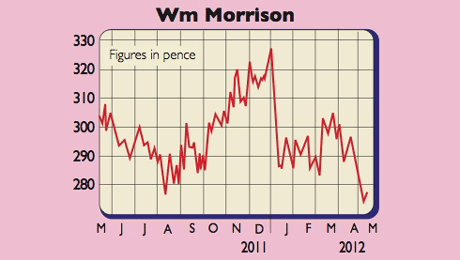Get the latest financial news, insights and expert analysis from our award-winning MoneyWeek team, to help you understand what really matters when it comes to your finances.
You are now subscribed
Your newsletter sign-up was successful
Want to add more newsletters?

Twice daily
MoneyWeek
Get the latest financial news, insights and expert analysis from our award-winning MoneyWeek team, to help you understand what really matters when it comes to your finances.

Four times a week
Look After My Bills
Sign up to our free money-saving newsletter, filled with the latest news and expert advice to help you find the best tips and deals for managing your bills. Start saving today!
Another price war has erupted in the grocery sector. Just about every supermarket is thrusting money-off coupons at its customers, seemingly oblivious to the potential impact on profits. Last week I received a £6 voucher from one store, even although I'd only popped in for £2.36 of milk. This latest bout of competitive discounting was initiated by Tesco, after company bosses felt the need to do something in the wake of its abysmal Christmas trading.
Yet what's interesting is that, despite all this price-cutting, the market share positions of the major players have hardly moved. According to the latest data from market research group Kantar Worldpanel, in the 12 weeks to 15 April, Tesco still led the pack, on 30.7%, down a little from 30.9% a year ago. Asda climbed to 17.6% (from 17%) thanks largely to its purchase of discount chain Netto, while Sainsbury's held steady at 16.6%. Morrisons, on the other hand, dipped 0.2% to 11.9%, after like-for-like sales at its stores fell 1% in the first quarter due partly to the decision not to copy its rivals' antics.
Why has Morrisons abstained? As chief executive Dalton Philips puts it: "You can pile in, you can blow your brains out and you can drive your top line, but it doesn't necessarily do anything for your profits." Discipline is the key. And Morrisons seems to be holding its nerve. The company is instead relying on its tried and tested formula of offering quality fare at keen prices, all laid out in a market stall format.
MoneyWeek
Subscribe to MoneyWeek today and get your first six magazine issues absolutely FREE

Sign up to Money Morning
Don't miss the latest investment and personal finances news, market analysis, plus money-saving tips with our free twice-daily newsletter
Don't miss the latest investment and personal finances news, market analysis, plus money-saving tips with our free twice-daily newsletter
Wm Morrison (LSE: MRW), rated BUY by Nomura

Indeed, the group differentiates itself by devoting most of its shelf space to food (rather than TVs and clothes). As well as its store network, Morrisons owns processing facilities and sustainable farms, so it is able to make about half of its produce in-house. This means it benefits from the trends towards home cooking and healthy eating, and chimes well with middle-class families who want everyday essentials as well as tasty treats.
While inflation remains sticky', Morrisons should also be in a decent position to pass on rising costs (once the price war dies down), because it largely sells necessities rather than luxuries.
For 2012, the City expects turnover and underlying earnings per share (EPS) of £18.5bn and 28.2p respectively. That rises to £19.5bn and 30.9p in 2013. This puts the stock on a price/earnings (p/e) ratio of ten, and a near 4% dividend yield, which is more than twice covered. I would instead value it on ten times its earnings before interest, tax and amortisation (EBITA). After deducting net debt of £1.5bn (gearing is 27%), that gives a value of around 335p a share. Morrisons also owns about 90% of its freehold properties (worth £6.6bn), providing great ballast to its rock-solid balance sheet.
There are a few risks. The company's greater exposure to the less affluent north makes it particularly vulnerable to a deeper recession. A lasting price war is also a threat. Yet Morrisons has plenty of growth left in the tank, as it rolls out convenience stores and online shopping.
Rating: BUY at 276p
Paul Hill also writes a weekly share-tipping newsletter, Precision Guided Investments. See www.moneyweek.com/PGI or phone 020-7633 3634 for more.
Get the latest financial news, insights and expert analysis from our award-winning MoneyWeek team, to help you understand what really matters when it comes to your finances.
Paul gained a degree in electrical engineering and went on to qualify as a chartered management accountant. He has extensive corporate finance and investment experience and is a member of the Securities Institute.
Over the past 16 years Paul has held top-level financial management and M&A roles for blue-chip companies such as O2, GKN and Unilever. He is now director of his own capital investment and consultancy firm, PMH Capital Limited.
Paul is an expert at analysing companies in new, fast-growing markets, and is an extremely shrewd stock-picker.
-
 New PM Sanae Takaichi has a mandate and a plan to boost Japan's economy
New PM Sanae Takaichi has a mandate and a plan to boost Japan's economyOpinion Markets applauded new prime minister Sanae Takaichi’s victory – and Japan's economy and stockmarket have further to climb, says Merryn Somerset Webb
-
 Plan 2 student loans: a tax on aspiration?
Plan 2 student loans: a tax on aspiration?The Plan 2 student loan system is not only unfair, but introduces perverse incentives that act as a brake on growth and productivity. Change is overdue, says Simon Wilson